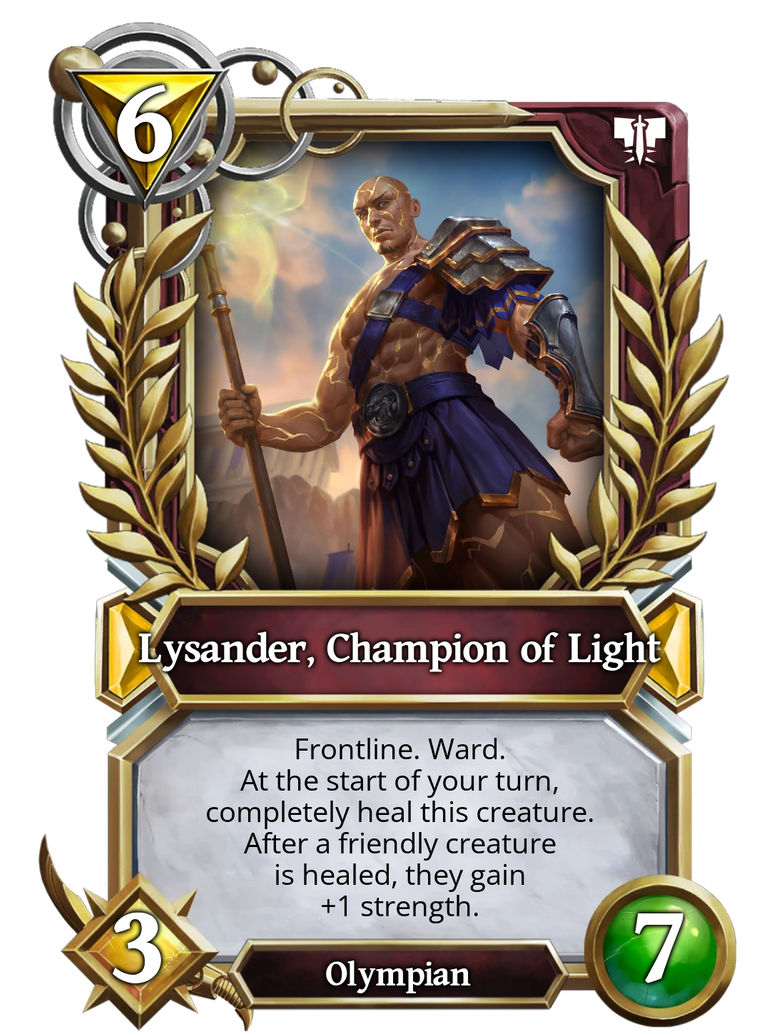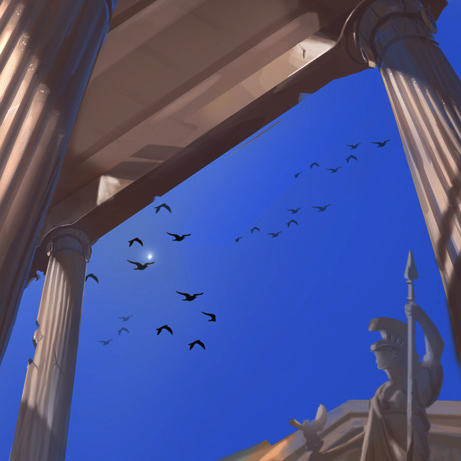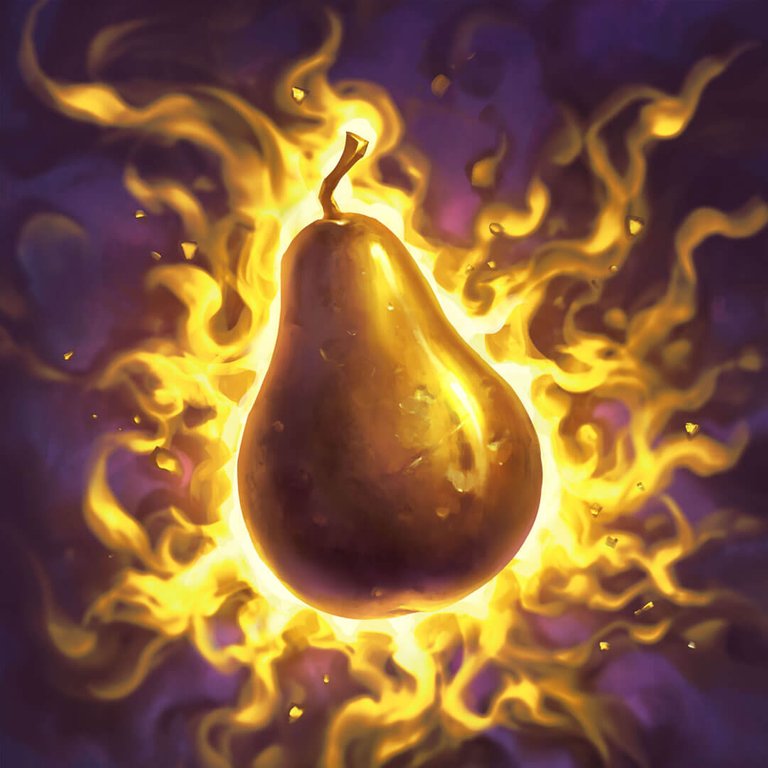Lysander, Champion of light
Welcome dear reader, to the sixth chapter of the Gods Unchained Mythology Series!
And God said, Let there be light: and there was light.
Genesis 1:3
We have a special article today because today we will not only seek truth in the cards but also the handcrafted Lore of Gods Unchained. A special thanks to Kelly Digges, who is the Narrative consultant for GU, for allowing me to put his articles under my rusty loupe.
I warn the reader, this will be an extensive and in depth article, but if you are interested in it, I hope you find the time to read it, even if you have to come back several times.
Before diving into the core of the article, I want to give a personal opinion about the critics of "originality" that one as a writer often encounters on the way, from people not familiarized with literature. There is a popular saying, which I couldn't find the source -that's why I called it popular - that derivers from a Christian point of view "Everything is already written". In the original Christian sense, its meaning is that our destiny has already been decided, but I like to think of this phrase in the field of literature, that all you can write, has already been written before. What I just did is a resignification, and it is what allows the human to keep creating despite the infinite of our past, and what makes original a piece of writing, and not unoriginal as many people I've known thinks.
We write adopting consciously or unconsciously the past to explain the same things under new circumstances, and/or with new objectives, that's what Marvel does in their movies, that's what allows us to do the same things every day without getting bored, and in literature, resignification is the engine of creation. It is not only the writer who resignifies but also the reader, and to allow it, the writer uses mainly symbology and history to bring depth into the art, to generate curiosity, to catch the reader, to teach and, entertain, because there are things in our mind that we don't even know that they are there, but when we read something, it provokes in us an indescribable feeling, a mix of all the things we know, and yet something new, and that is the magic of the word, and the world.
The lore articles I will analyze are a well-constructed piece of literature, build upon mythological and historical figures and events to create a new world led by unchained gods, I suggest reading them if you didn't, I'll leave the links below:
Without further introduction, let's dive into the symbology, mythology, and History of Lysander, our champion of light!

"I am the Champion of Light. My duty is to spread the Light in the world. To heal, to defend, to teach, to help"
Kelly Digges, Lysander's Trial.
History and symbology behind the card
Names first ladies and gentlemen, let's break down Lysander, Champion of Light while taking into account the art of the card.
I believe our champion is resgnified from The most renowned "Lysander" in history, Lysander, the commander of the Peloponnesian league, who fought against the Delian league in the second Peloponnesian war (431 - 404 BC), in which Lysander lead his float into a decisive victory in the Battle of Aegospotami. The consequences of the battle saw Athens (Main power behind the Delian league) to surrender, given the impossibility of import by sea any kind of product, and as a condition of the surrender, Lysander change the goverment of the city. In the card, you'll be able to see the Parthenon rising above the cliff, and a small blue sail underneath. The parthenon is a main symbol for the greek culture, the cliff and the sail indicates that Lysander would be standing up in the deck of one of his ships, and as you might see, victorius as the light covers his face. I found this symbology as a strong indicator of our character historical background.
"Champion" derivates from the latin campus (Field) which in the middle ages turned into campio meaning combatant in a duel, to later be adopter in the old french as champion bringing to our days the present definitions of the word:
1: A person who fights or speaks for another person or in favor of a cause a champion of equal rights.
2: A person accepted as better than all others in a sport or in a game of skill.
3: The winner of first place in a competition.
Merriam-Webster dictionary.
Here we take the first definition, "A person who fights in favor of a cause" in this case, the cause is the Light, giving us Lysander, Champion of Light.
The meaning of Light for Lysander is given by Kelly Diggens in Lysander's Trial, in the continuation of the quote I put below the picture of Lysander:
To heal, to defend, to teach, to help. To lift people up and show them what we can do for each other. That is the quest. That is the Light.
Next stop is the description of the card. Frontline could be perfeclty fitting with his role of commander, specially in the historical context of the Peloponnesian war, because commanders where in the front of the army up until the artillery started to being popularize in the XVIII century. Ward is fitting with the lore we will analyze in the next section, because our Champion is guarded by Thaeriel, Gods Unchained's light God. Same thing goes for the healing upon the character at the start of each turn. The strenght gaining of friendly characters could be given by his presence in the battlefield, augmenting the morale of his warriors, spreading his light upon them.
About the tribe of the card, "Olympian" we have established in previous chapters of this series that the tribe is given to all of those who came up from greco-latin culture, even though "Olympian" definitions do not completely match the characters, but let's not forget that it is a game, and it must be playable and we can not ask 100% accurancy, that said, Gods Unchained is in my experience one of the better constructed universes. Finally we have the attack and defence values, and I could perfectly being overanalyzing, but I love what I do, so I'm doing anyway. Number three represents in christianity, and therefore, most of the occident, the heavenly glory of what is whole and good, and that it is because of the Holy Trinity, the father, the son, and the Holy Spirit. For the number seven, continuing the christian tradition, we have the meaning of completion and perfection, because it was in the seventh day that God rested after creating the world.
Lore analysis: Lysander's Origin.
Let's start by the genesis of our champion, which we can found in the lore text "Lysander's Origin"
Here we enter in the entertaining terrain of literature. Remember the Parthenon standing behind Lysander? Well we might have another look of it, and another symbologic construction of it in the first chronologically appearence of Lysander in the lore:

[Credits to Chris Clay (GU dev) for allowing me to use all the GU visual art available]
Lysander kneels in prayer, his spear and plumed helmet beside him. His god towers above him, hard white marble inlaid with gold that shines in the morning light. Behind the statue stands the temple itself, closed to worshippers.
Kelly Digges, Lysander's origin.
In that single paragraph quote above we have the conjuction between Lysander and Athena Parthenos, main deity of Athens, from who the parthenon was constructed and the word is originated, Parthenos meaning "Virgin". We read "Lysander kneels in prayer, his spear and plumed helmet beside him" and that is the exact weponary and helmet used in the depictions of Athena, and in the picture above. Here we have the use of its symbology to give the values of Athena to Lysander, that is Justice, strategy in combat and wisdom. In a historical context, we can also find in the texts of Duris of Samos (Greek historian 350 BC - 281 BC) that Lysander, the commander, was probably the first greek to whom people constructed altars and sculptures for his cult, being this, yet another foundation for the character.
The image above is the temple where our champion is praying. In the lore, the temple is consecrated to Thaeriel, but the statue we see in the picture is an sculpture of Athena. We can also see the Parthenon behind, and a bird sculpture too, which is a Carrion crow, a bird used to consecrate Athena in early greece. Additionally we see the same birds flying over, but we can have another symbology of it, an incoming storm, as we read in Lysander's trial that moments after his praying, the city is invaded. The cracked columns indicates a previous conflict, and in the lore it is the Tartessians, who came back once again to the city of Lysander, Parthon, a clear name creation from the city where the Parthenon is.
After his praying, Lysander know that something is coming, and they are the Tartessians:
The Tartessians have come before. They have met the Parthene army in battle, besieged the city, even scaled the walls. But this time, something is different.
To describe you the Tartessians, we will another quote from the same article:
Everyone knows tales of the Tartessians, how the children of their warrior families learn to fight before they can talk.
On "Tartessians" we can think of the historical Tartessians who were a culture in the south of Spain, although there is not sufficient physical evidence of them, which could be given by natural disasters burying it. Here we can think also of the Tartessians as the Spartans, which led the League that historical Lysander commanded. The color red of their troops, they confidence and way to live for the war and the training of children to support the state army, as Kelly writes, "For the Tartessians, war is a way of life".
Continuing the story, the war unleashes in Parthon, and as Lysander is fighting the young army of Tartessians, he sees it:
The daemon prince that commands the Tartessians. It is an obsidian-clad horror that towers over its troops, with a horned head and a maw full of jagged teeth. The thing carries an enormous axe, twice as long as Lysander is tall, with an axe-head the size of an ox-cart.
Kelly Digges, Lysander's Origin.
I found beauty in this creature and a powerful symbology. It is a very well-constructed description. First, it reminds me of the Deamon prince in Warhammer, but more importantly, to the minotaur, the epitome of mythological creatures. The horned head is symbology for the devil, and, in addition to his size and axe, we have the depiction of the classical minotaur. Here comes a beautiful detail, Lysander kills this creature in the lore after a ferocious battle (With the help of the god of light) and in Homer's Odyssey, where we find the main source for the myth of the minotaur, Theseus kills the monster, and the fine aspect of it is that Theseus is a King and hero of Athens, as our Lysander, is the hero of Parthon.
The last thing I want to mention from this article (Lysander's Origin) is the protection that Thaeriel gives to Lysander in battle. As we have stated in Aenea's article from last week, it is a common element in epic poetry the protection from gods to the heroes, because part of what makes its epic, is that the heroes have a destiny to fulfill, and Gods acts to keep the main characters in their paths. In the story, Lysander asks protection to the gods, and Thaeriel hears and fill the body of the champion with light; and I quote the article:
Thaeriel?”
“OF COURSE.”
“My lord,” says Lysander.
“YOU SAY YOU DO NOT KNOW WHY I SENT YOU BACK.”
“I have never known,” says Lysander.
“AS I SAID BEFORE: I SAVED YOU AGAINST FUTURE NEED.”
The future is...
Lysander's Trial

Your trial is to retrieve the Golden Pear of Tartessos and bring it here.
Kelly Digges, Lysander's trial.
In the epic poem of the Greek author, the hero Jason must recover a golden fleece (the woolly covering of a goat) from Colchis - present Georgia - to recover the throne that usurped from his father.
In the first paragraph of Lysander's trial, we see the use of the symbology honouring Jason's trial:
The man with golden scars emerges from the forest, weary but content. He is Lysander of Parthon, sole champion of the God of Light, and he is carrying a writhing, reeking goat on his shoulders.
Today's literature is built upon the shoulders of the greeks, and Lysander from many of them, and here Kelly Digges wonderfully resumes it. In the quest, instead of the fleece, we have a pear, and I found it as a very good use of its symbology, in this case derivate from Christianity. About his disciples, Jesus said:
By their fruits you will know them
Matthew 7:20
It is Lysander who must retrieve the fruit from a sacred tree and to keep it in him for his trial, because his spirit is full of light, hence the golden cracks on his body, and the spirit he has represents his values, and:
The fruit of the Spirit is love, joy, peace, longsuffering, kindness, goodness, faithfulness, gentleness, self-control
Galatians 5:22
All the values he must spread, if he wishes to spread the light.
Another tribute paid to other heroe of Greece and implemented wisely in the narrative is stated in the next quote, where Lysander's son speaks to his father:
Father, you’re the Champion of Light, but you spent most of today chasing goats through the woods. Plus half of yesterday rebuilding a stable, and the day before that resolving some ridiculous village dispute—
Chasing goats through the woods is the immediate act before the opening of the articles, and resigifies the tenth labour of Heracles, to obtain the cattle of the three-bodied giant Geryon; the rebuilding of the stable reminds of the fifth labour, clean the Augean stables in a single day. Meanwhile resolving the ridiculous village dispute is something Jesus does several times in the different gospels.
The golden pear is found in Tartessos, land of the Tartessians, whom upon arrival of our hero rises against him. With no other option than fighting, Lysander covers with clothing his spear to not harm the villagers who are enraged by the god of Tartessos, Auros, God of war, and against his son's wishes, Lysander fights alone and without killing anyone. After seeing his father succeed, he understands the value of virtue, he has been taught. It is very important, and remarkable that the writer choose this path because it shows how the hero never deviates from his values and completes his task while teaching the villagers, and his son.
Once he left the village with the golden pear, Thaeriel appears and speaks:
“Mercy is laudable,” he says. “Pity is not. Do not confuse them.”
Upon this words, the article ends with Lysander staring at the fire, thinking about the words, and this is another philosophical statement that is made in epics story, that the hero must not only teach, but also learn, usually from the gods like in this case, because the hero is never a complete god, and can not be, and that's why he must always keep failing and learning.
Final statement
I'm proud and happy of discovered this game. It is a pleasure to see that the people working on it are doing an excellent job. The articles that I analyzed are an example of how the lore should be constructed, and we all should be thankful for it because it gives longevity and depth to the project.
This is the end of this article, so thanks for reaching it. If you liked it, or have any suggestions for future content, let me know in the comments or send me a message.
That is all for today, I hope you enjoyed the history and the stories, and I'll be here next week for another episode.
Have a great grind!
Is the game complicated to play? I love that the team takes such great pride in it ♥️
Hi @wrestlingdesires ! I think that like most card games, the difficult part at the beginning is to know the cards and effects, after that, you can be a very good player with a general set of principles, and like in chess, you get better at microdecisions and knowing when to break those principles. The nice thing about these game is that you can play for free, and maybe earn just a little bit while learning, and just check if it suits you!
That does sound like fun 🙌 Hopefully one day I'll jump in and join!
Feel free to talk to me whenever you want it! I can try to be a Virgil and show you the path!
Thanks, I'll do that 🙌
hey man, ty for the nice post and have a great grind too!
Thank you very much @acidovoador!